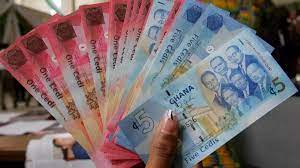Ghana’s Finance Minister Ken Ofori-Atta has reassured Ghanaians that the Cedi, which has been described by some international finance institutions as the world’s worst-performing currency this year, will stabilize by the end of this year.
The minister told members of the Association of Ghana Industries (AGI) at a forum in Accra on Thursday last week that part of the ongoing efforts to shore up the value of the Cedi included the clampdown of the illegal foreign currency market by the Bank of Ghana (BoG).
According to the minister, the move by the BoG was aimed at addressing speculation, which was fuelling the depreciation of the local currency as well as other challenges militating against the local currency in the long term.
The report by the Graphic on Monday said that the minister, however, urged Ghanaians to create a macroeconomic environment capable of meeting the essential needs of individual households and businesses.
Apart from the activities of the BoG, the minister’s optimism may not be unconnected with the impressive progress recorded in the meeting between the delegation from the International Monetary Fund (IMF) and Ghanaian officials on the $3 billion bailout fund from the IMF.
There are indications that the IMF intervention fund may be released before the end of this year or the first quarter of 2023.
Ghana’s economy has been hard hit by rising inflation of over 30 percent in October, high food and petrol prices, huge debt burden and the depreciating value of the Cedi. Some stakeholders have blamed the low value of the Cedi to the activities of the illegal foreign exchange market and the preference of some Ghanaians to save their money in dollars thereby triggering the scarcity and low exchange rate of the Cedi against the dollar.
Unimpressed with the management of the Ghanaian economy by the ruling New Patriotic Party (NPP), former President John Dramani Mahama, has lent his voice to the frustrations of small entrepreneurs as they daily break their backs to keep their businesses open against rising prices of goods.
It will be recalled hundreds of traders had recently locked their shops to protest the rising cost of goods and low value of the Cedi.
According to local media reports, Mahama said in his Facebook post that the “prices of items, including everyday medication, salt, gari and cooking oil, are constantly on the rise.”
“If you do not buy an item at a particular point in time, you are likely to find that the price has significantly increased a few hours later,” he said.
Unfortunately, the ruling NPP and the government did not anticipate the downturn in the country’s economy as it severally announced that it would never contemplate seeking any form of financial assistance and advice from the World Bank and the IMF during President Nana Addo Dankwa Akufo-Addo’s first term in office.
However, about two years into his second four-year tenure, the Cedi depreciated as much as 3.3%, before paring the loss to 11.2750 to the dollar in Accra, resulting in losses this year to over 45 percent.
Apart from the misfortunes of the Cedi and Ghana’s high debt stock, some global rating agencies have downgraded Ghana’s credit rating. For instance, in February this year, Moody, a Rating Agency, downgraded Ghana’s Long-Term Issuer and Senior unsecured bond Ratings to Caa1 from B3 and changed the outlook from negative to stable.
According to Moody’s, the downgrade is due to the “increasingly difficult task government faces in addressing the intertwined liquidity and debt challenges, pandemic induced revenue underperformance, tight funding conditions on international markets, materially decreasing governance and institutional strength and inflexibilities in the government budget”.
Perhaps, Ghanaians are now anxiously awaiting the conclusion of the ongoing discussions with the IMF for the recovery of their ailing economy, stabilization of the Cedi and reduction in high food prices and above all the return of their nation’s economy on the path of growth.
GIK/APA


